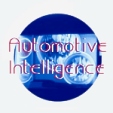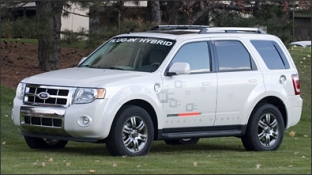
Automotive Intelligence - the web for automotive professionals and car enthusiasts
December 05, 2007
This Week:
-
New Porsche 911 GT3 Cup starts with 420 bhp into 2008 Motorsport Season
-
Start of production and world premiere for the Audi A3 Cabriolet in Hungary
-
Ford Delivers First Escape Plug-In Hybrid To Southern California Edison
-
One Millionth Alabama-Built Mercedes-Benz Vehicle Rolls Off the Production Line
© 1998 - 2007
Copyright &
Disclaimer
Automotive Intelligence,
www.autointell.com
All Rights Reserved .
For questions please contact
editor@autointell.net
|
Ford Delivers First Escape Plug-In Hybrid To Southern California Edison
ANAHEIM, Calif. - Ford Motor Company’s first demonstration Escape Plug-In Hybrid is ready to roll on California roads. Ford today delivered the first of 20 research PHEVs to Southern California Edison to begin road testing as part of a unique partnership between the automaker and utility. The Ford Escape Plug-In Hybrid, a research vehicle using high voltage, lithium-ion batteries, can deliver up to 120 miles per gallon which would mean far fewer trips to the gas station. The vehicle uses common household current (120 volts) for charging. Full charge of the battery takes six to eight hours. When driven for the first 30 miles following a full charge, the Ford Escape PHEV can achieve up to 120 mpg when driven on surface streets. The vehicle is not range limited by the amount of charge available in the high-voltage lithium-ion battery, because once the charge in the battery has been depleted, the vehicle continues to operate as a fuel efficient, standard Ford Escape Hybrid. The transition is automatic and unnoticeable to the driver. |
|
|
|
The delivery comes just five months after Ford and Southern California Edison announced their collaboration to advance the commercialization of plug-ins by exploring the values of new technologies and new business models when the battery is connected to the home and, in time, the electrical grid. |
“The electrification of vehicles has sparked significant interest in this country. The delivery of this Ford Escape Plug-In Hybrid research vehicle today represents another step in our development and understanding of the technology and its place in the overall energy picture,” said Sue Cischke, senior vice president, Sustainability, Environment and Safety Engineering. “PHEVs are one element of our blueprint for sustainability that includes actions ranging from refinements in gasoline fueled engines and transmissions, to the development of hydrogen fuel cells.”
“We are united in a common cause,” said Lynda Ziegler, Southern California Edison’s senior vice president, Customer Service. “We bring our expertise in energy production, delivery and management, and combine it with Ford’s expertise in hybrid technology. Together, we are seeking solutions to address the needs of our shared customers and to ultimately help this nation achieve energy independence and reduce greenhouse gas emissions. “This is not about simply connecting the car to the grid. It’s about integrating vehicles and energy storage technologies into the energy system of the future”.
The two companies are exploring new business models related to the electrification of vehicles that could help lower the cost of PHEVs to make them more affordable to consumers.
“Although the energy infrastructure is in place, significant challenges remain for widespread adoption of PHEVs,” said Cischke. “Cost, durability and reliability issues all need to be addressed before these vehicles can make a significant impact on the global issues of climate change and energy security.”
Ford and SCE will jointly conduct testing of the vehicles, some of which may be evaluated in typical customer settings to model overall home and grid values. The testing will provide valuable data related to the durability, reliability and safety of new battery technology. The cost of advanced lithium ion batteries means the technology is currently not economically feasible for widespread vehicle application.
Photo: Ford
(Dec. 3, 2007)
| .
Homepage News Companies Management Publications Events Guestbook Search . |
